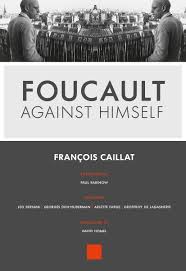 Foucault Against Himself
Foucault Against Himself
by François Caillat
Arsenal Pulp Press. 150 pages, $17.95
AMONG THE THINKERS loosely associated with structuralism and post-structuralism, Michel Foucault (1926-1984) is one of the few (along with Noam Chomsky and Jacques Derrida, perhaps) who achieved something close to popular fame. Some of this was due, sadly, to the fact that Foucault died of an AIDS-related illness; the revelation of Foucault’s homosexuality surprised and scandalized many at the time even though Foucault wasn’t particularly secretive about his gay life.
Foucault was an original thinker who said things about history, power, madness, and sexual identity that no one had ever said before.
Foucault defies easy categorization, and he seems to have wanted it that way. He was a professor at some of France’s most prestigious universities, but he disdained the trappings and duties of the academy (at least the European variety), and used his position to push the boundaries of what was considered worthy of scholarly analysis. He was a philosopher who chose to focus his energies on history. Many of his contemporaries have remarked upon Foucault’s “double life,” and it is this sense of inherent contradiction that forms the theme of François Caillat’s Foucault Against Himself, a collection of interviews with four people who knew and worked with Foucault: Arlette Farge, Leo Bersani, Georges Didi-Huberman, and Geoffrey de Lagasnerie. The book is based on Caillat’s documentary of the same name.
One does not need to be intimately familiar with Foucault’s works to appreciate this slim volume. Indeed, it is an excellent introduction to his thinking because readers are guided through it by individuals who speak in a conversational and direct way about how Foucault’s life informed his work. They offer illuminating anecdotes and asides, such as recollections about Foucault’s penchant, during his Bay Area years, for frequenting San Francisco’s gay leather and S/M scene. Farge describes how Foucault visited prisons and read to inmates from Discipline and Punish. (One is reminded of the famous productions of Waiting for Godot staged in prisons.) Foucault Against Himself presents an engaging portrait of the man and his overall refusal to be pinned down to any one category, whether professional or personal.
________________________________________________________
Jim Nawrocki, a writer based in San Francisco, is a frequent contributor to this magazine.





